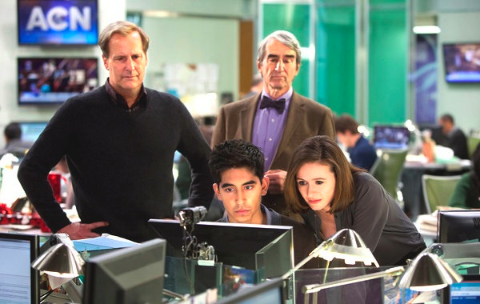Aaron Sorkin Speaks Truth To Stupid ■ by Ben Atkinson
There are plenty of news shows out there and even plenty of entertainment shows that cover news. The Newsroom is a drama about journalists reporting news, but the novelty is that it uses actual news stories from the recent past. The show, which first aired summer of 2012, begins its own timeline in April of 2010.
The Newsroom might just as well be the lovechild of Sorkin’s earlier shows The West Wing and Sports Night. The characters are inspiring but imperfect, with a constant battle between their demons and better angels, with the latter prevailing.
Writer and creator Aaron Sorkin believes there are viewers who are disappointed with the current state of journalism and with news shows geared more towards entertaining than informing. The Newroom revolves around the battle between the journalists and ratings-obsessed network executives. Sorkin fans will find the struggle of creative professionals to excel under management constraints familiar (see Sports Night and Studio 60 on the Sunset Strip). His own struggles with ABC over the use of laugh tracks and live studio audiences may have influenced his writing. The Newsroom seems to have found a more willing party with HBO which has renewed the show for a second season set to air in June.
The Newsroom
■
Jeff Daniels brilliantly portrays lead anchor Will McAvoy. Daniels comes a long way from his famous role in Dumb and Dumber, and is more than convincing as one of those hyper-intelligent Sorkin characters who always has the appropriate facts, statistics, and trivia on hand for any situation. McAvoy is another in Sorkin’s line of great men who shape history. Of course he’s a man; while the women on the show wear powerful shoes and are far from the kitchen, their primary role is to inspire and prop up their male counterparts.
Despite the indignant speeches that inspire the left and infuriate the right (hardly rarities in a Sorkin script), McAvoy is a conservative, in the classical sense of the word. Registered Democrats and West Wing fans shouldn’t find this too off-putting, as it rarely explicitly surfaces. McAvoy’s acknowledged quixotic vision of himself as a knight defending truth, justice, and the American way while on a mission to civilize the savages rings rather false to a Leftist view of history. His constant forays against the Tea Party are less an attack on conservative philosophy than an attempt to rescue his party from its fringe elements, something Indiana Republicans might cherish after last year’s Senate race.
Emily Mortimer’s Mackenzie McHale is the show’s heart. Her passion drives everyone and her pure commitment to her profession counters the cynicism that threatens to conquer her colleagues. She is the better angel sitting on the proverbial shoulder.
Together their mission statement is “speak truth to stupid.” Journalism is idealized as a quest for truth, not as a “balance” with equal coverage between two ideological camps. McAvoy isn’t afraid to pursue a line of questioning beyond the prepared talking points and won’t let his interview subjects evade the issues with non-answers and deflections.
Yes, it is easier to look back on a two-year old story with hindsight and imagine how one would like it to have been reported. Sorkin isn’t bashing journalists, but is extolling what they could be as he reminds viewers of the importance of the Fourth Estate.
Reliving actual events makes watching The Newsroom a unique experience. Remembering where one was and how one viewed the events as they happened has a certain element of nostalgia. Many stories are not so pleasant, especially those all too similar to recent events. The first episode deals with the BP oil spill in the Gulf of Mexico and brings to mind the recent grounding of the Shell drill barge off Alaska. The episode chronicling the shooting of Congresswoman Gabrielle Giffords can’t help but recall recent images from Sandy Hook. Nevertheless, the show manages to maintain an optimistic tone. Rather than compromise journalistic integrity and make deals with the devils, the journalists in The Newsroom rise to the challenge. Season 1 opens with allusions to Man of La Mancha, and it isn’t clear if we are witnessing a fool tilting at windmills or a brave knight stepping forth to do battle with giants. It ends, however referencing a different musical and the enduring embers of hope that can be seen even in the ashes of defeat. Camelot may have been but “for one brief shining moment,” but that doesn’t make a fool of King Arthur. Not everything about The Newsroom is perfect, but it does remind us that when we look over the “great blue motion of the sunlit sea,” some of the drops sparkle.
▲
The Ryder, February 2013

